 Stephanie Hunt |
Stephanie Hunt |  Fri, December 13, 2013 at 14:31 |
Fri, December 13, 2013 at 14:31 |
Lynn Mabey nominates her brother-in-law Ian Mabey
******************************************************************
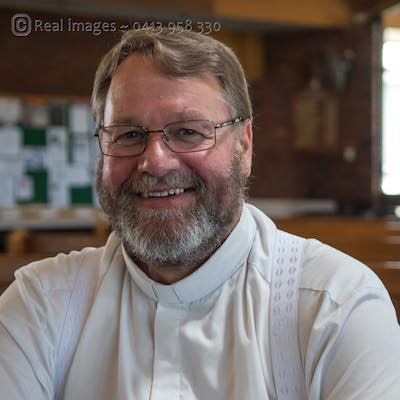 Politics and the Priesthood
Politics and the Priesthood
I meet Reverend Ian Mabey at “the office”. At fifty-four years of age, the Rector of St John’s Anglican Church is a big, jolly-looking man with a resonating voice, a finger-crushing handshake and an embracing laugh. I’m guessing that Ian is a firebrand behind the pulpit, a natural deliverer of the word of God.
And Ian agrees that he’s a natural. When people ask him why he became a priest his answer is simple. “I could do no other. This is what I was meant to do.” But it took over 40 years for Ian to enter the priesthood, so his path to God was never as straightforward as those words might have you believe.
The Natural Progression
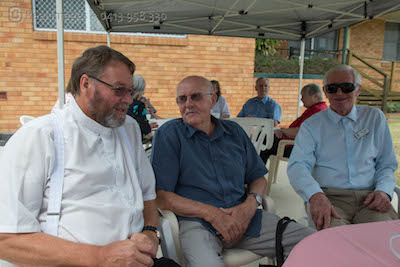 A calling to God was never the expected course for the youngest son of Horace and Freeda Mabey, orchard farmers in southwest WA. “My early memories were wanting to work on the farm and spend time with my father,” he explains. Although his father encouraged Ian to have “something else” behind him, the family farm seemed his destiny.
A calling to God was never the expected course for the youngest son of Horace and Freeda Mabey, orchard farmers in southwest WA. “My early memories were wanting to work on the farm and spend time with my father,” he explains. Although his father encouraged Ian to have “something else” behind him, the family farm seemed his destiny.
A learning disability also looked destined to shape his future. Identified as dyslexic in grade 5, Ian struggled with reading and writing throughout his school years. His education was predictably prodded toward science. “I did the top stream maths and science and as little English and social studies as I could, and went off to university to do agricultural science,” Ian recalls.
When Ian left school, quit agricultural college after only one year, and returned to work alongside his father on the family farm no one would have been surprised.
Friends and neighbours would have been equally unsurprised by his growing interest in politics. “I grew up in a very socially involved family,” explains Ian. “I joked in my wedding speech that I grew up always knowing where to find my mother and father because I could read about it in the paper.”
While his father had been involved in local politics, Ian’s interest turned to state and federal politics. He became deeply involved with the Liberal party. It was the Brian Burke era in WA, and the horrifying corruption of the times was a catalyst for Ian to become involved. A “young turk” on the rise, Ian sat on the state executive of the Liberal party and ran in an unwinnable seat to show his loyalty and hone his political skills.
By the age of 34 there seemed little question that Ian would become a Tim Fisher style farmer-turned-politician. Surely Canberra would soon be calling.
God Comes Calling Instead
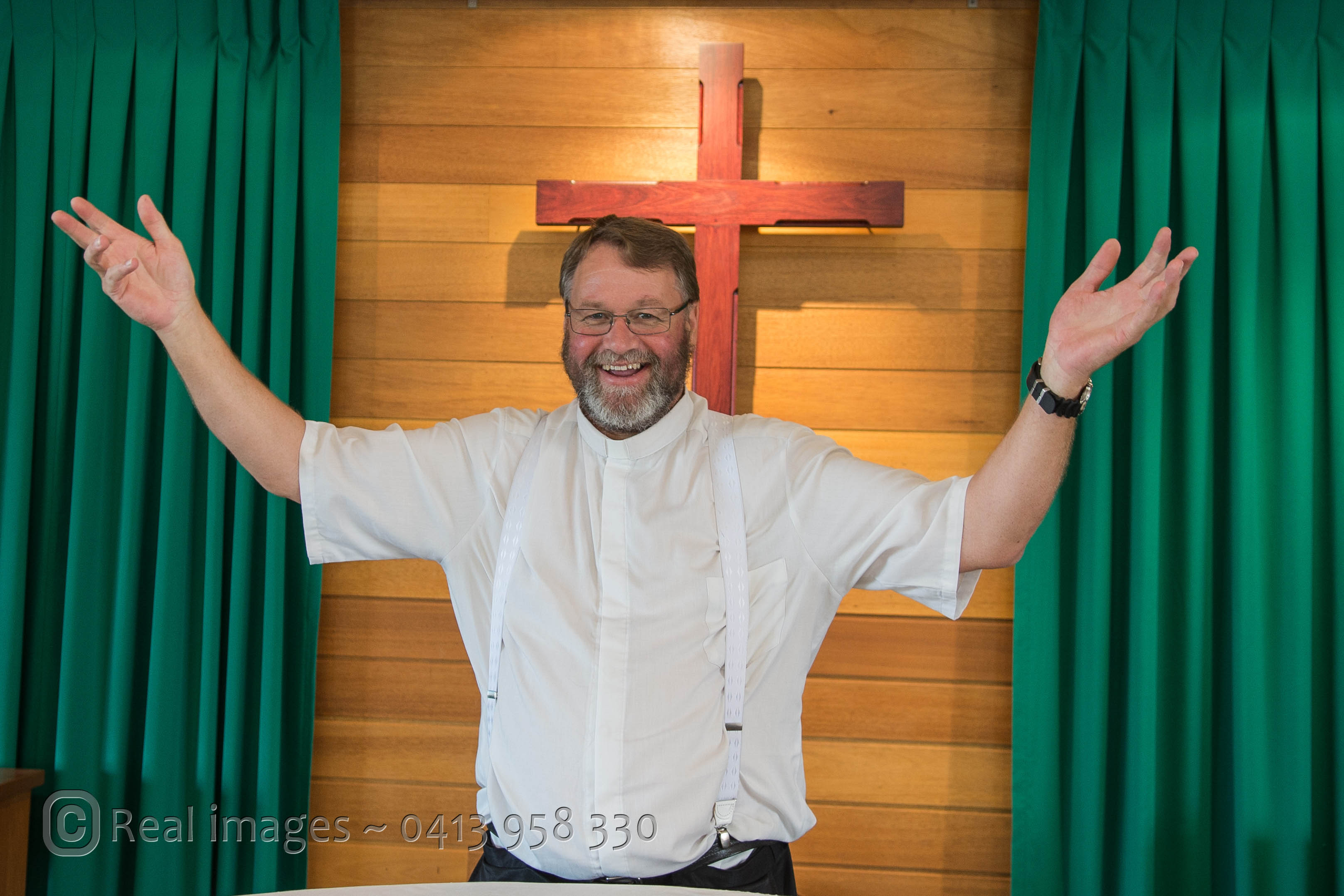 Debating was one of Ian’s greatest political skills. “Oh yes, I was a very capable debater,” Ian acknowledges. “I once chewed up Wilson Tuckey and spat him out.” So it is ironic that debating ultimately forced Ian to question the inexorability of his political career.
Debating was one of Ian’s greatest political skills. “Oh yes, I was a very capable debater,” Ian acknowledges. “I once chewed up Wilson Tuckey and spat him out.” So it is ironic that debating ultimately forced Ian to question the inexorability of his political career.
“I remember going to a state council meeting. I was on my feet putting forward a point of view when it suddenly dawned on me that I was wrong. And I remember thinking, ‘Oh, it doesn’t matter. I can win this anyway.’ I won the debate and then drove the 3-hours to my home. But I didn’t like that person.” The seeds of self doubt were sown.
Ian’s family had always been the sort of Anglicans that went to church at Christmas and Easter, but his wife Wendy, whom he married at 23, was a regular churchgoer. “I stayed in bed on Sundays while she went to church,” he admits.
When their daughter Renae was born, two years after the wedding, she was very ill. “She was operated on at 20 hours old and again at 6 weeks,” says Ian “We were offered baptism before she had her first operation because she was likely to die on the table.” For the first time Ian found himself engaged in a serious spiritual conversation.
He started accompanying his wife to church on Sundays. “I went to hold the baby,” he says. “At least that’s what I told myself.” His fellow parishioners went out of their way to make Ian feel welcome. A sense of belonging grew.
As Ian’s conscience began to ease him away from politics, the church began to beckon. “Eventually I faced the fact that I was being called into the church,” he explains.
Being called to God is a slow process. “I talked to the priest and he said, ‘Think about it’. I talked to the bishop and he said, ‘Think about it’. By then a couple of years had rolled by.”
The hardest conversation was with his wife. “She had married a farmer,” says Ian, recalling how nervous he was to broach the subject with her. When he finally worked up the courage her response was, “Thank heavens. I thought you wanted to be a missionary.” Wendy and Ian agreed to see where the church might lead them.
At the age of 41 Ian was priested in the diocese of Bunbury, WA. The farm had been sold. The dyslexic child had grown to a man holding a Bachelors Degree in Theology. The pulpit had replaced the debating halls.
What's the Difference Between a Politician and a Priest?
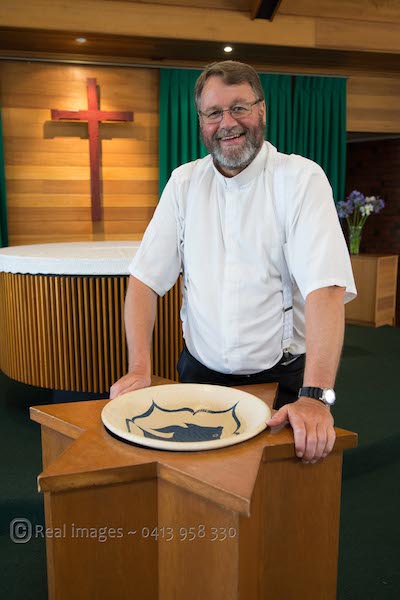 Meeting Ian 13 years later, I sense that he genuinely belongs in the church. This was, after all, his natural path, his true calling. But as he tells me tales from his life in the church it strikes me that being a priest is often not that different to being a politician.
Meeting Ian 13 years later, I sense that he genuinely belongs in the church. This was, after all, his natural path, his true calling. But as he tells me tales from his life in the church it strikes me that being a priest is often not that different to being a politician.
“Kondinin and Corrigin was about having cups of tea in kitchens,” Ian says, recalling his first parish assignment. Expansive and struggling, this outback parish 300km east of Perth needed more worshippers and more money. The hours spent criss-crossing his 100,000 kms district bear a striking resemblance to the fundraising and vote winning slog of a political campaign.
Collie, an old coal-mining town 60km from Bunbury WA that was to become Ian’s second parish, required the touch of a populist politician. Arriving in 2005, Ian found a once active church that was no longer viable on its own. He lobbied the mines to employ him as chaplain, and then began the work of building alliances.
“I’d drive the trucks with (the miners). I loitered outside the toilets where they gathered at breaks. I could sit in the boardrooms with management and in the washrooms with the toilet cleaners. I could talk to them all.” Like any good politician Ian resonated with “everyman”.
In Collie Ian also experienced the vagaries of the political machine. While still in Kondinin and Corrigin he had become a trustee of the Bunbury diocese, and over time increasingly involved with the governing bodies of the church. “There was a change in the political mood in the diocese,” Ian recalls. “I got voted off as a trustee. At one meeting I got tipped out of everything.” He took it pretty hard.
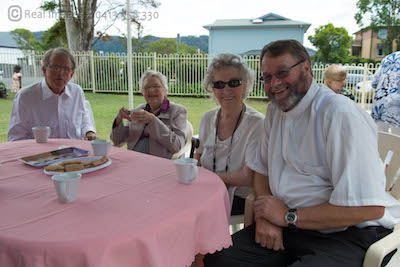 At least in part that political bruising led to the move to Coffs Harbour three years ago, where Ian’s political role has changed to that of lone voice campaigning for change. For the first time he is ministering to a strong parish, yet he can see that trouble is coming with the average age of the congregation about 70.
At least in part that political bruising led to the move to Coffs Harbour three years ago, where Ian’s political role has changed to that of lone voice campaigning for change. For the first time he is ministering to a strong parish, yet he can see that trouble is coming with the average age of the congregation about 70.
“We’re shrinking, which means less people have to do more and at the same time our finances shrink,” Ian says. “I think my job at the moment is to be the squeaky wheel.” And he recognises that this has political drawbacks. “You don’t get elected bishop by talking about finances,” he acknowledges.
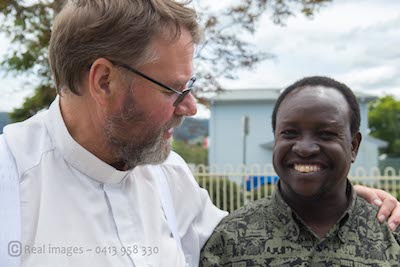 On the surface, Ian’s life as a priest has many of the hallmarks of the campaigning, lobbying and jockeying for position of the political life he had left behind. It’s in the detail that the differences become clear.
On the surface, Ian’s life as a priest has many of the hallmarks of the campaigning, lobbying and jockeying for position of the political life he had left behind. It’s in the detail that the differences become clear.
Ian recalls receiving a telephone call one morning in Corrigin. An old fellow who lived on the edges of the parish was dying of cancer. “I jumped in my car and drove to Hyden, 120kms away, and then another 80kms on a gravel road to his place,” Ian says. “When I got there they were putting him in the ambulance and I prayed with him before they took him to Perth. I drove back through Hyden, back to Corrigin and packed a bag, then on to Perth. I sat by him for the afternoon and most of the night and he died at 2am with his family around him. It was a great honour.”
There is no politics in this, only love.
******************************************************************
Ian wants to nominate four people - and I decide to let him name two. He nominates Kuei Manyoun a young Sudanese woman who has created a successful hair salon in Coffs Harbour, and Kassimiro Yanga, also a Sudanese refugee, who is himself being discerned for the priesthood. I am so excited that my trail of interesting people has finally led me to our Sudanese population. There is no doubt that this is going to be fascinating!
 Stephanie Hunt |
Stephanie Hunt |  Fri, December 13, 2013 at 14:31 |
Fri, December 13, 2013 at 14:31 |
Reader Comments